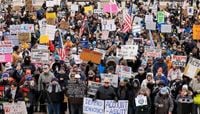As many Americans seek to escape the policies of Republican President Donald Trump, a notable trend of reverse migration to Mexico is emerging. This shift, characterized by a growing number of individuals—many of Mexican descent—relocating to cities like Mexico City, has been fueled by rising concerns over civil rights, economic pressures, and a desire for a more stable environment.
According to a 2023 report, approximately one million Americans now reside in Mexico, constituting about 20% of the estimated five million Americans living abroad. This influx has been particularly pronounced since the COVID-19 pandemic, as individuals seek refuge from the increasing political and social polarization in the United States.
Tiffany Nicol, a 45-year-old financial advisor, made the move to Mexico following the police killing of George Floyd in May 2020. "I no longer feel safe in my country as a person of color," she stated, reflecting on her decision to leave. Nicol had considered returning to Chicago to be closer to her daughter, but Trump’s election victory dashed her hopes. "In November, I was in Chicago waiting to see what would happen in the elections. Now, I am looking for a way to get my family out of the country," she lamented.
The ongoing decline in civil rights and soaring drug prices in the U.S. have left many feeling disillusioned. Nicol remarked, "The United States is retreating in civil rights, and everyone is affected by the situation." Since Trump's return to the White House, his administration has imposed limits on diversity, equity, and inclusion programs, which he views as discriminatory. He has also called for the removal of murals associated with the Black Lives Matter movement, which gained momentum after Floyd's death.
Lee Jimenez, a 38-year-old yoga instructor, also left the U.S. in 2022, citing an increase in violence against people of color, especially those of Latin American descent. "Now I see clearly the small acts of discrimination," he shared, recalling a recent experience in Los Angeles where he and his friends, all Black, were seated in the back of a restaurant despite available better seating. Jimenez accused Trump of undermining efforts designed to protect diversity and rights for marginalized communities.
Oscar Gómez, a 55-year-old business consultant, had long contemplated leaving the U.S. but was propelled to act after Trump’s election. He arrived in Mexico City three weeks ago with seven bags and his dog, Iggy. "When Trump won, I thought it was time to go. His first term was terrifying... and now, when I watch the news from the U.S., I feel relieved to be here," Gómez said. He left behind a beautiful apartment in San Francisco, having seen his income decline due to the cancellation of diversity programs he had worked with.
"It’s ironic that my parents left Mexico for a better life in the U.S., and now I am returning to Mexico for the same reason," he added, highlighting a poignant reversal in the migration narrative.
Jessica James, known as "Jai Jai," splits her time between Mexico and Alaska due to her work in hunting. The forty-something American expressed her disappointment at the number of people who voted for Trump. "It’s frustrating or even terrifying to see so many people support him," she said. Born in San Diego to a Mexican mother and raised in Republican-leaning Alaska, James dreams of obtaining Mexican citizenship. "Things haven’t changed much here, but the polarization is severe on social media and in the media," she noted.
Mexico City, governed by a leftist administration since 1997, has adopted a progressive approach on various issues, including abortion and same-sex marriage, attracting those seeking a more liberal environment.
The trend of Americans relocating to Mexico reflects a broader sentiment among many that the American dream is slipping away. As they navigate the complexities of their new lives, these individuals express a mixture of hope and nostalgia for what they have left behind. They are part of a growing narrative that challenges traditional migration patterns, driven by a quest for safety, stability, and a renewed sense of belonging.
The phenomenon of reverse migration highlights the significant impact of political climate on personal choices, revealing a deep-seated desire for a society that embraces diversity and inclusivity. As the landscape of America continues to shift, the stories of those who have chosen to make Mexico their new home serve as a poignant reminder of the ongoing struggle for civil rights and social justice.







